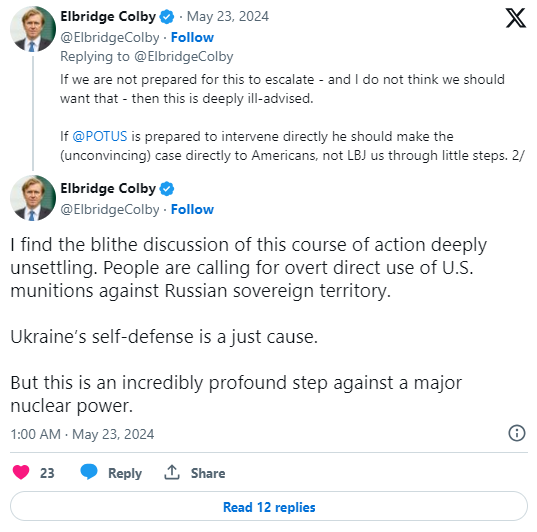U.S. Secretary of State Antony Blinken walks with former Undersecretary of State for Foreign Affairs Victoria Nuland in the White House in Washington, D.C. on March 25, 2024 | Photo: Antony Blinken
“Russia has issued a credible threat to counter-escalate” in the event of the policy shift, noted one former Pentagon official. “Are we prepared for such escalation?”
Reposted from Common Dreams
Anti-war voices this week sounded the alarm over U.S. Secretary of State Antony Blinken’s newfound embrace of letting Ukraine use weapons supplied by the United States to attack targets inside Russia—a policy critics say risks a catastrophic escalation between the world’s two top nuclear powers.
So far, the Biden administration has strictly forbidden Ukrainian forces—who are defending their country from the invasion ordered by Russian President Vladimir Putin in February 2022—from attacking targets inside Russia with U.S.-supplied weapons. This is in keeping with President Joe Biden’s stated objective of “trying to avoid World War III.”
However, The New York Times‘ David Sanger reported Wednesday that “the consensus around that policy is fraying” amid “a vigorous debate inside the administration over relaxing the ban to allow the Ukrainians to hit missile and artillery launch sites just over the border in Russia.”
Elbridge Colby, a former deputy assistant defense secretary during the Trump administration, warned Wednesday on social media that “there is exceptional and ill-advised danger in this course,” as “Russia has issued a credible threat to counter-escalate” in the event of the policy shift.
“Are we prepared for such escalation?” he asked.

Michael Young, a senior editor at the Carnegie Middle East Center, said Wednesday that Blinken’s “move toward persuading Biden to allow Ukraine to widen the war to Russian territory is just a crazy idea, and makes any eventual negotiation all but impossible.”
Ukrainian President Volodymyr Zelenskyy says forces and weapons amassed just across the Russian border have enabled Russia’s recent territorial gains, including near Kharkiv, Ukraine’s second-largest city, which has come under heavy Russian bombardment in recent days.
After what Sanger called a “sobering” visit by Blinken to the Ukrainian capital Kyiv last week, the secretary of state has been pushing for a change in the Biden administration’s stance. According to Sanger, “the consensus around that policy” of restraint is unraveling. It is not quite clear yet how many senior Biden administration officials support the move to greenlight Ukrainian attacks on Russia with U.S. arms, but one highly controversial undersecretary of state who recently resigned is a vocal proponent of the policy.
That would be Victoria Nuland, a neoconservative who is reviled by anti-imperialists around the world for her hawkish history that includes playing a key role in the plot to overthrow the pro-Moscow government of then-Ukrainian President Viktor Yanukovych during the Euromaidan uprising a decade ago.
“They need to be able to stop these Russian attacks that are coming from bases inside Russia,” Nuland toldABC News on Sunday. “Those bases ought to be fair game… I think it’s time for that because Russia has obviously escalated this war.”
The Biden administration is also weighing whether to train Ukrainian forces inside Ukraine, as opposed to in Germany under current policy—a move that could put U.S. and NATO troops in the line of fire.
Ukrainian officials welcomed Blinken’s shift.
“Blinken’s statement, which he repeated twice, that Ukraine is the one to choose its targets, created hope that the United States had changed its position: Ukraine should make its own decisions on the territories where it uses certain Western weapons, especially American ones,” Nataliia Halibarenko, who heads Ukraine’s mission to NATO, told Ukrinform on Thursday.
“The decision that we have the right to use American weapons beyond Ukraine must be made sooner or later,” she added. “It is a pity that we are wasting time searching for a solution that should not cause doubts. But we will continue to promote it at all levels.”
The U.S. would not be the first country to allow Ukraine to use weapons it supplies for attacks inside Russia. The United Kingdom has sent Ukraine Storm Shadow long-range air-launched cruise missiles, and British Foreign Secretary David Cameron says Ukraine “absolutely has the right to strike back at Russia.”
The debate within the Biden administration over Ukraine’s use of U.S.-supplied arms comes amid Russian military drills involving tactical nuclear weapons, which Russia’s Defense Ministry earlier this month claimed were ordered in response to “provocative statements and threats of certain Western officials.”
Brett Wilkins is a staff writer for Common Dreams.




